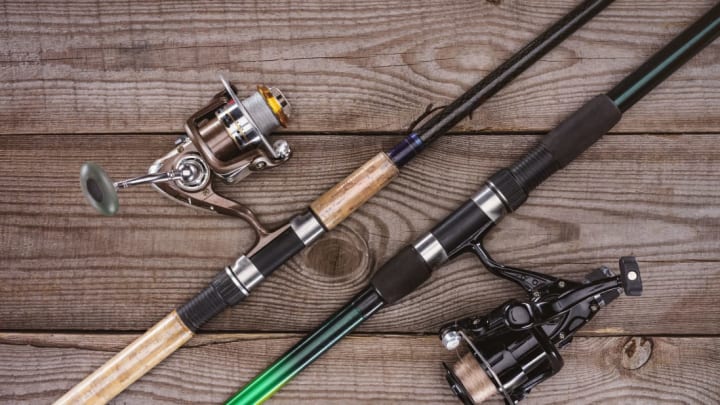There’s more to libraries than just plain old books. Many, if not most, also have movies, music, and audio and ebooks to lend out. But what about a parking pass for a Civil War fort? Or a circular saw? Well, depending on where you live, you can borrow those, too. Here are just a few odds and ends that some libraries lend out.
1. FISHING POLES
If you’re not ready to commit to buying your own fishing gear, your local library might have you covered. The Brewerton, New York branch of the Northern Onondaga Public Library, for example, loans out fishing poles and other fishing tools, along with several branches of other New York State library locations. Libraries in four counties in Maryland also have rods available for patrons.
2. MUSEUM PASSES
A bunch of libraries lend out passes for free or discounted admission to museums and other institutions. Chicago libraries have “Museum Passports” good for admission for families of four to 15 different area attractions like the Field Museum and the Shedd Aquarium. The Fairfield Public Library in Connecticut lends admission passes for 42 different museums in Connecticut, Massachusetts, and New York. In Michigan, the Library Network provides “Michigan Activity Passes” [PDF] for admission or discounts at more than 100 museums, galleries, and other institutions across the state. Georgia libraries have passes for Georgia State Parks and historic sites that provide admission for four people and cover parking fees.
3. ART
Need something pretty to hang on your wall, or a conversation piece for your mantle? Libraries in Ann Arbor, Minneapolis, Iowa City, Aurora, Illinois, and Braddock, Pennsylvania. have original artwork, prints, posters, and even sculptures that you can take home and display.
4. INTERNET ACCESS
The Chicago Public Library and New York Public Library both loan out mobile hotspots so patrons can have mobile broadband Internet access at home or on the go.
5. A BOOK CLUB
At the Ann Arbor District Library, you can borrow a Book Club To Go, with 10 copies of a featured book (the selections range from best-sellers to the obscure, and include fiction and non-fiction), a DVD if a movie adaptation exists, and a packet that contains discussion questions and tips for running a book club. The Edwardsville Public Library in Illinois has a similar service called Book Club in a Box.
6. SEEDS
Arizona’s Pima County Public Library has seeds for hundreds of types of vegetables, herbs, and flowers that patrons can take home and plant in their gardens. You can’t return them like books, of course, but the library encourages borrowers to save and donate seeds from their grown plants.
7. POWER TOOLS
Have a home project you wanna do yourself? The Berkeley and Oakland public libraries both have a variety of carpentry, masonry, plumbing, electrical, and landscaping tools to lend out. The Ann Arbor library also has a tool collection, but focuses on “uncommon tools that you might not have lying about,” like thermal leak detectors and air quality meters.
8. MUSICAL INSTRUMENTS
The Ann Arbor library’s instrument collection also centers around the uncommon and unusual. You can borrow everything from guitar effects pedals to theremins and voice transformers. If you’re going for a different sound, the Forbes Library in Northampton, Mass. has banjos, bongos, and ukuleles.
9. A GREEN SCREEN
Take your home movies to the next level with help from the Skokie, Ill. public library’s digital media lab. They’ve got computers loaded with video editing software, microphones and mic stands and, for those digital effects-heavy scenes, a green screen.
10. A DOG
Stressed out Yalies can stop by the Lillian Goldman Law Library and “check out” General Montgomery (nicknamed Monty), a certified therapy dog, for a 30-minute petting session.
11. A PERSON
Libraries around the world host “human library” programs where visitors can sit down with human “books” and learn about their different cultures, backgrounds, and life experiences.
